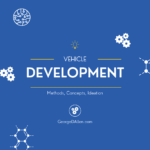Innovations In New Vehicle Occupant Sensing

Optimizing Technology
In the ever-evolving landscape of engineering, the concept of optimization plays a pivotal role in enhancing the initial design of various technologies. One of the critical areas where optimization is making a significant impact is in the field of Vehicle Occupant Sensing. In this article, we will delve into the latest innovations in engineering, particularly focusing on artificial intelligence (AI) and sustainable technologies, and how these breakthroughs are optimizing the design of occupant sensing systems in vehicles.
Referencing Passive Occupant Safety: https://georgedallen.com/enhancing-road-safety-the-evolution-of-passive-vehicle-occupant-safety-systems/
General reference to Design Optimization: https://en.wikipedia.org/wiki/Design_system
Artificial Intelligence and Vehicle Occupant Sensing: A Seamless Integration
Artificial intelligence has become a game-changer in engineering, revolutionizing how systems perceive and respond to their environment. In the realm of vehicle occupant sensing, AI is being harnessed to create more intelligent and adaptive systems. Advanced sensors, coupled with machine learning algorithms, enable vehicles to not only detect the presence of occupants but also analyze their behavior and adjust safety features accordingly.
By leveraging the power of artificial intelligence and sustainable technologies, the engineering community is not only optimizing the initial design of vehicle occupant sensing but also paving the way for safer, more efficient, and environmentally friendly transportation solutions. The journey of optimization is ongoing, and as breakthroughs continue to emerge, the future holds the promise of further enhancing the safety and sustainability of our vehicles.
Sustainable Technologies in Occupant Sensing: Striking a Balance
As sustainability takes center stage in engineering, innovations in occupant sensing are aligning with eco-friendly practices. Sustainable materials and energy-efficient technologies are being incorporated into the design of sensors and systems. This not only reduces the environmental impact but also contributes to the overall efficiency and longevity of the components.
Moreover, sustainable technologies in occupant sensing extend beyond the vehicle itself. The optimization of these systems contributes to the development of eco-conscious transportation solutions, aligning with the global push towards greener and cleaner modes of mobility.
Practical Applications and Benefits
The practical applications of optimized occupant sensing systems are vast and extend across various industries. In public transportation, for example, smart buses equipped with advanced occupant sensing can dynamically adjust seating arrangements based on the number and type of passengers, optimizing space utilization and improving overall efficiency.
In the automotive industry, vehicle manufacturers are leveraging these innovations to design cars that prioritize occupant safety while minimizing environmental impact. This not only meets regulatory standards but also enhances the overall market appeal of their products.
Challenges and Future Considerations
While the benefits of optimizing occupant sensing systems are evident, challenges persist. Ensuring the security and reliability of AI algorithms, addressing potential ethical concerns, and achieving widespread industry adoption are critical hurdles that engineers continue to navigate.
Looking ahead, continuous research and collaboration will be key to refining these technologies and addressing emerging challenges. The optimization journey in occupant sensing is an ongoing process, with engineers committed to pushing boundaries and ensuring that safety, sustainability, and efficiency remain at the forefront.
Real-World Examples and Case Studies
To illustrate the impact of optimized occupant sensing, let’s consider the case of a leading automotive manufacturer that implemented AI-based occupant sensing in its luxury SUV line. The system’s ability to accurately identify and adapt to various occupants resulted in a significant reduction in collision-related injuries, earning the vehicle high safety ratings.
About George D. Allen Consulting:
George D. Allen Consulting is a pioneering force in driving engineering excellence and innovation within the automotive industry. Led by George D. Allen, a seasoned engineering specialist with an illustrious background in occupant safety and systems development, the company is committed to revolutionizing engineering practices for businesses on the cusp of automotive technology. With a proven track record, tailored solutions, and an unwavering commitment to staying ahead of industry trends, George D. Allen Consulting partners with organizations to create a safer, smarter, and more innovative future. For more information, visit www.GeorgeDAllen.com.
Contact:
Website: www.GeorgeDAllen.com
Email: inquiry@GeorgeDAllen.com
Phone: 248-509-4188
Unlock your engineering potential today. Connect with us for a consultation.


